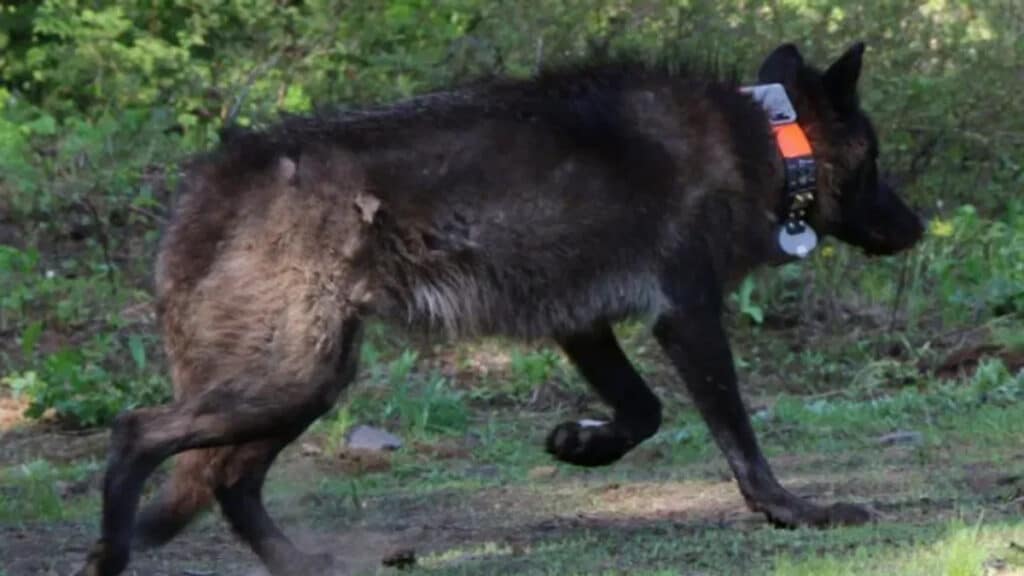In 2019, the U.S. Fish and Wildlife Service awarded two separate $5,000 awards to whistleblowers who played a critical role in identifying the killer of an endangered gray wolf. The existence of these whistleblower awards were not previously made public and were made available to Whistleblower Network News in response to a Freedom of Information Act (FOIA) request.
In October 2016, a female gray wolf known as OR-28 was found dead from a single gunshot wound in the Fremont Winema National Forest near Summer Lake, Oregon. Gray wolves were one of the original species protected under the Endangered Species Act (ESA) and it is illegal under the ESA to kill a gray wolf.
“The illegal killing of this young mother wolf is tragic, as every individual wolf is essential to the future of Oregon’s small and vulnerable population,” said Scott Beckstead, Oregon senior state director for The Humane Society of the United States, at the time of the killing. “Wolves are one of the most misunderstood and persecuted species in North America, with special interest trophy hunting and trapping groups vying to strip them of protections. Wolves are a keystone species, and killing a breeding female can disrupt pack structure, which may lead to increased conflicts with livestock.”
As part of its law enforcement efforts the U.S. Fish and Wildlife Service (FWS) sought to identify and prosecute the culprit. In order to do so, on October 11, 2016, the agency posted a press release alerting the public to a $5,000 award “for information leading to a conviction in the case.”
According to FOIA documents provided by FWS, following the release an unidentified whistleblower “voluntarily contacted law enforcement authorities and supplied them with valuable information about the wolf shooter.” Specifically, the whistleblower provided the name of the shooter.
Around the same time, another unidentified whistleblower “contacted law enforcement to notify them of the conversation she had with a member loosely affiliated with the hunting party,” according to the FOIA documents. The documents further state that the whistleblower “provided information that law enforcement was able to track back to who had killed OR 28 (gray wolf) which allowed law enforcement to corroborate the information provided with physical evidence.”
In the documents, FWS agents note that the whistleblowers’ “information helped lead to a criminal conviction.” In 2019, the U.S. Department of Justice announced that the killer of OR-28 pleaded guilty today to a single count of unlawfully taking an endangered species.
In addition to highlighting the critical role the whistleblowers played in this case, FWS agents note in the FOIA documents that the whistleblower award was a key incentive. They write: “There have been seven (7) wolf death investigations conducted in Oregon and Washington since 2013, including the death of OR 28. Of the seven (7) investigations, the only case that resulted in a prosecution was the death of OR 28. The success in the OR 28 case was directly related to the information provided as a result of the reward offer.”
The agents requested that the whistleblowers be awarded $5,000 under the whistleblower award provisions of the Endangered Species Act (ESA). According to reporting by WNN, FWS only paid out four whistleblower awards under the ESA from November 2019 through August 2022.
In that timeframe, FWS only paid out twenty-one whistleblower awards in total. According to whistleblower advocates, this number shows that the agency continues to fail to prioritize whistleblower awards as a powerful enforcement tool despite their proven efficacy in cases such as this one.
“Fish and Wildlife continues to radically underutilize whistleblower awards,” says whistleblower attorney Stephen M. Kohn, a leading expert on whistleblower law. “The program has tremendous potential and could revolutionize the enforcement of wildlife crime. Fish and Wildlife needs to follow the lead of the SEC and other agencies and implement a robust whistleblower award program.”
According to Kohn, part of implementing a robust whistleblower award program is to publicize award payments. For example, while still protecting a whistleblower’s identity by redacting any identifying information, the SEC widely promotes whistleblower awards it issues through its highly successful whistleblower award program. These public announcements help incentivize other whistleblowers to come forward and help deter criminals who worry about having the whistle blown on them.
FWS by contrast has never publicly acknowledged the whistleblower award payments made in connection with the conviction of the killer of the endangered gray wolf.
“It is a missed opportunity to not publicize successful whistleblower awards,” says Kohn. “Highlighting award payments is a crucial way to inform the public about the opportunity to receive an award in exchange for voluntarily providing key information about wildlife crimes.”
Read More of WNN’s Ongoing Series of Exclusives on Fish and Wildlife Service Whistleblower Awards
WNN Exclusive: Fish and Wildlife Service Whistleblower Awards Remain Severely Underutilized
Fish and Wildlife Service Must Leverage Whistleblower Awards to Fight Wildlife Crimes
